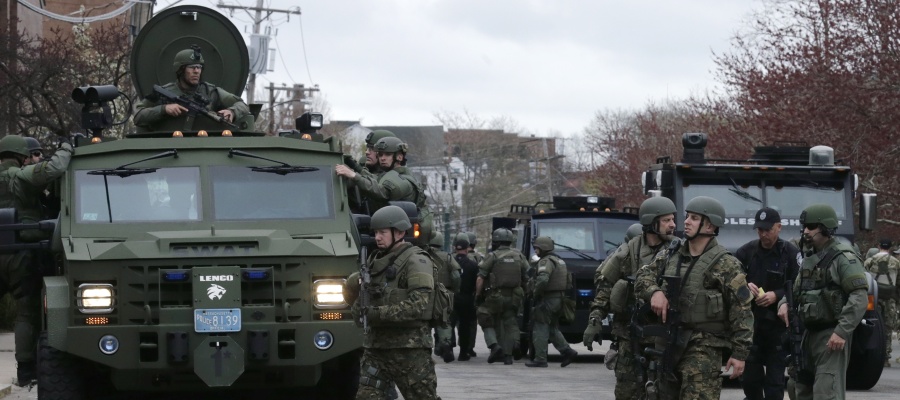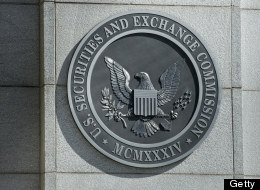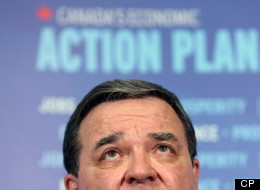There were signs that President Barack Obama might rein in the mass militarization of America's police forces after he won the White House. Policing is primarily a local issue, overseen by local authorities. But beginning in the late 1960s with President Richard Nixon, the federal government began instituting policies that gave federal authorities more power to fight the drug trade, and to lure state and local policymakers into the anti-crime agenda of the administration in charge. These policies got a boost during Ronald Reagan's presidency, and then another during President Bill Clinton's years. Under President George W. Bush, all of those anti-drug policies continued, but were supplemented by new war on terrorism endeavors -- yet more efforts to make America's cops look, act and fight like soldiers.
Democracy Gone Astray
Democracy, being a human construct, needs to be thought of as directionality rather than an object. As such, to understand it requires not so much a description of existing structures and/or other related phenomena but a declaration of intentionality.
This blog aims at creating labeled lists of published infringements of such intentionality, of points in time where democracy strays from its intended directionality. In addition to outright infringements, this blog also collects important contemporary information and/or discussions that impact our socio-political landscape.
All the posts here were published in the electronic media – main-stream as well as fringe, and maintain links to the original texts.
[NOTE: Due to changes I haven't caught on time in the blogging software, all of the 'Original Article' links were nullified between September 11, 2012 and December 11, 2012. My apologies.]
Wednesday, July 10, 2013
Context, Tory MP Russ Hiebert's shifty campaign for Bill C-377, and me
 There has always been a troubling stream of disingenuousness that runs through the Harper Government's campaign for Bill C-377, supposedly a bill to require unions to be more transparent to their members but widely perceived as having a more sinister agenda.
There has always been a troubling stream of disingenuousness that runs through the Harper Government's campaign for Bill C-377, supposedly a bill to require unions to be more transparent to their members but widely perceived as having a more sinister agenda.For the moment, this poorly drafted and likely unconstitutional private member's bill is stuck in Parliamentary limbo -- the Senate, to almost everyone's astonishment, having done its job as a chamber of sober second thought and returned the bill to the House of Commons with significant amendments designed to correct some of its gravest flaws.
Hedge Fund Advertising Ban Lifted By SEC
WASHINGTON — For the first time, hedge funds will be allowed to advertise to the general public under a rule adopted Wednesday by federal regulators.
The Securities and Exchange Commission voted 4-1 to lift a decades-old ban on hedge funds marketing their investments to a wide audience.
Hedge funds are still allowed to sell securities only to an exclusive group of investors: those with a net worth of at least $1 million excluding their primary residence, or annual income of more than $200,000 in each of the two most recent years. About 7.8 percent of U.S. households would qualify.
The change was mandated by legislation enacted last year. The law also makes it easier for small startup companies to raise capital without having to comply immediately with SEC reporting rules.
Original Article
Source: huffingtonpost.com
Author: AP
The Securities and Exchange Commission voted 4-1 to lift a decades-old ban on hedge funds marketing their investments to a wide audience.
Hedge funds are still allowed to sell securities only to an exclusive group of investors: those with a net worth of at least $1 million excluding their primary residence, or annual income of more than $200,000 in each of the two most recent years. About 7.8 percent of U.S. households would qualify.
The change was mandated by legislation enacted last year. The law also makes it easier for small startup companies to raise capital without having to comply immediately with SEC reporting rules.
Original Article
Source: huffingtonpost.com
Author: AP
Hurricanes And Climate Change: Storms Likely To Get Stronger And More Frequent, Study Shows
Hurricanes are Mother Nature’s largest and most destructive storms. Fed by warm ocean waters and moist atmospheric conditions, about 90 such storms — also known as tropical cyclones — form worldwide each year. With the population of coastal areas growing daily and sea level on the rise, how these monster storms may change as the climate continues to warm is an increasingly urgent question facing climate scientists, insurance companies, and public officials.
Thurgood Marshall's Prescient Warning: Don't Gut the 4th Amendment
In a story on the secret body of law being created by the FISA court, The New York Times reports that "in one of the court's most important decisions, the judges have expanded the use in terrorism cases of a legal principle known as the 'special needs' doctrine and carved out an exception to the Fourth Amendment's requirement of a warrant for searches and seizures, the officials said." A judicially created exception to the Fourth Amendment?! How did that happen, you might wonder.
How Not to Help the Poor: The Lesson of Soaring College Prices
Whenever policymakers argue over ways to lower the budget deficit, one of the most popular ideas on both sides of the aisle is "means testing" programs like Medicare or Social Security. Instead of cutting everybody's benefits, the idea is to reduce them for the rich and middle classes while leaving them intact for the poor.
In theory, means-tested programs should be more efficient and progressive because they don't spend money on those who can pay their own way. But one concern that dogs these proposals is that the programs will lose support and funding as soon as budgets get tight. As the saying often goes: "Programs for the poor are poor programs."
In theory, means-tested programs should be more efficient and progressive because they don't spend money on those who can pay their own way. But one concern that dogs these proposals is that the programs will lose support and funding as soon as budgets get tight. As the saying often goes: "Programs for the poor are poor programs."
The N.S.A., the “Encroaching Police State,” and the System
A lefty friend of mine writes:
Very sad and disappointed to read your “Snoop Scoops.” Liberal commentators are canary birds for me; they tell me about the health of trailing edge of resistance to the encroaching police state. You’re not worried about this, though. And you’re certainly not angry. I say “trailing edge” because as you’ve developed as a pundit you’ve fallen farther and farther behind in the search for justice. Alas. I was hoping that as you aged you’d get better at telling truth to power.
Very sad and disappointed to read your “Snoop Scoops.” Liberal commentators are canary birds for me; they tell me about the health of trailing edge of resistance to the encroaching police state. You’re not worried about this, though. And you’re certainly not angry. I say “trailing edge” because as you’ve developed as a pundit you’ve fallen farther and farther behind in the search for justice. Alas. I was hoping that as you aged you’d get better at telling truth to power.
U.S. Government Pays Hundreds Of Dollars To AT&T And Verizon For Every Wiretap
WASHINGTON (AP) — How much are your private conversations worth to the U.S. government? Turns out, it can be a lot, depending on the technology.
In the era of intense government surveillance and secret court orders, a murky multimillion-dollar market has emerged. Paid for by U.S. tax dollars, but with little public scrutiny, surveillance fees charged in secret by technology and phone companies can vary wildly.
In the era of intense government surveillance and secret court orders, a murky multimillion-dollar market has emerged. Paid for by U.S. tax dollars, but with little public scrutiny, surveillance fees charged in secret by technology and phone companies can vary wildly.
Comey's Crickets
Some of us have been shouting from mountaintops, others from molehills: James Comey, currently sailing smoothly through Senate Judiciary Committee hearings for confirmation as chief of the Federal Bureau of Investigation, was:
(a) in charge, and proudly so, of a “terrorism” case that began with a detention without charges, continued with made-up and spurious charges, and ended with a conviction won against an American whose treatment during confinement (on the American mainland) turned his brain to jello;
(a) in charge, and proudly so, of a “terrorism” case that began with a detention without charges, continued with made-up and spurious charges, and ended with a conviction won against an American whose treatment during confinement (on the American mainland) turned his brain to jello;
The Biggest Secret Trade Deal You've Never Heard Of, Explained
The Obama administration is nearing the end of negotiations on one of the most far-reaching international free trade agreements in US history. The deal, called the Trans-Pacific Partnership (TPP), is aimed at boosting trade among 12 participating countries, and the next and final round runs July 15-24. The negotiations don't just concern the selling of shoes and toothpaste across borders; the trade deal, which will be the product of a three-year process, has the potential to affect many areas of American life. And because information on the negotiations is not public, it's hard to know what those impacts will be. Here's what we do know so far:
What countries are involved? The TPP currently includes the United States, Australia, Brunei, Canada, Chile, Japan, Malaysia, Mexico, New Zealand, Peru, Singapore, and Vietnam. But it could eventually include half the countries in the world.
What countries are involved? The TPP currently includes the United States, Australia, Brunei, Canada, Chile, Japan, Malaysia, Mexico, New Zealand, Peru, Singapore, and Vietnam. But it could eventually include half the countries in the world.
Senate Democrats Spar Over Wall Street Reform
On Friday, a provision that financial reformers consider a critical part of the 2010 Dodd-Frank Wall Street reform act is set to finally go into effect. This measure was designed keep big banks from engaging in risky trading overseas that could contribute to another economic collapse at home—but Senate Democrats are sparring over whether it should be put into action.
The Dodd-Frank law, passed in order to avoid another financial crisis, requires Wall Street regulators to draw up tighter rules governing the trading of derivatives (financial products with values derived from from underlying variables, like crop prices or interest rates), and one question has been how these new standards will apply to US banks operating abroad. Advocates of financial reform contend these regulations must be strictly applied to the overseas trading activity of US banks. They note that Wall Street banks do more than half their derivatives dealing through foreign subsidiaries; if a bet in one of these foreign locations goes sour, the trading loss could come home to roost and threaten economic security in the United States. Foreign branches of US banks have so far been exempt from Dodd-Frank rules on derivatives, and Big Finance wants to keep it that way.
The Dodd-Frank law, passed in order to avoid another financial crisis, requires Wall Street regulators to draw up tighter rules governing the trading of derivatives (financial products with values derived from from underlying variables, like crop prices or interest rates), and one question has been how these new standards will apply to US banks operating abroad. Advocates of financial reform contend these regulations must be strictly applied to the overseas trading activity of US banks. They note that Wall Street banks do more than half their derivatives dealing through foreign subsidiaries; if a bet in one of these foreign locations goes sour, the trading loss could come home to roost and threaten economic security in the United States. Foreign branches of US banks have so far been exempt from Dodd-Frank rules on derivatives, and Big Finance wants to keep it that way.
Canada's Middle Class Falling Behind Everyone Else, Report To Flaherty Finds
If you’re wealthy in Canada, things have been good for you in recent decades. And if you’re poor, you’ve likely seen some wage gains and increased support from the government in the form of tax decreases.
But if you’re in the middle, you’ve likely been getting nowhere — or, at best, getting somewhere thanks to ever-larger debt loads.
A presentation made to Finance Minister Jim Flaherty last October, and obtained by Postmedia this week through access to information laws, shows the extent of the problem.
But if you’re in the middle, you’ve likely been getting nowhere — or, at best, getting somewhere thanks to ever-larger debt loads.
A presentation made to Finance Minister Jim Flaherty last October, and obtained by Postmedia this week through access to information laws, shows the extent of the problem.
Cabinet Shuffle: Harper Expected To Make Massive Changes, Bring In 'New Blood'
OTTAWA — Government insiders are gearing up for what could be Prime Minister Stephen Harper’s largest cabinet shuffle since the Tories first formed a government in 2006.
It will be a massive cabinet shuffle, with an infusion of new blood and a certain amount of a new generation, Conservative strategist Yaroslav Baran says.
It will be a massive cabinet shuffle, with an infusion of new blood and a certain amount of a new generation, Conservative strategist Yaroslav Baran says.
What I Learned at the Tar Sands
A rental van slides off the muddy track running through the middle of our campsite, and sits at a comical 45 degree angle in the ditch. Its driver, who shall remain nameless, good-naturedly takes a ribbing for his driving skills from the assembled rubberneckers.
I hop down into the ditch, and quickly draw the conclusion that there is nothing to do but call a tow truck. But then something strange happens. Without coordination or command, the onlookers organize themselves to get the vehicle out of the ditch, and do so in less than 60 seconds flat.
I hop down into the ditch, and quickly draw the conclusion that there is nothing to do but call a tow truck. But then something strange happens. Without coordination or command, the onlookers organize themselves to get the vehicle out of the ditch, and do so in less than 60 seconds flat.
Military staff in Cold Lake forced to find second jobs
OTTAWA -- Junior members of the military at the airbase in Cold Lake, Alta., have to take second jobs to make ends meet, says a new report from the military ombudsman.
Pierre Daigle investigated the sky-high cost of living in the resource-rich region of Alberta after complaints from people posted to 4 Wing, a major jet-fighter base.
"I was surprised," Daigle said in an interview Tuesday.
Pierre Daigle investigated the sky-high cost of living in the resource-rich region of Alberta after complaints from people posted to 4 Wing, a major jet-fighter base.
"I was surprised," Daigle said in an interview Tuesday.
Last week's job numbers and the perils of punditry
Last week, Statistics Canada released an article on changing labour market conditions for young workers since the 1980s and its monthly Labour Force Survey for June.
Thursday's article found that, compared to the early 1980s, employment outcomes have improved for Canadian women between 25 and 34. Employment outcomes deteriorated for men in that age range in provinces that do not produce oil. The picture was mixed for this male cohort in oil-producing provinces.
Thursday's article found that, compared to the early 1980s, employment outcomes have improved for Canadian women between 25 and 34. Employment outcomes deteriorated for men in that age range in provinces that do not produce oil. The picture was mixed for this male cohort in oil-producing provinces.
Homeless sex trade worker's death still not considered a homicide by Toronto police
She was found in a plastic bag two months ago. Floating in the Toronto harbour.
Kasandra Bolduc had been missing since November.
“And hung out regularly on Queen Street both in the east and the west,” said Doug Johnson, a street pastor at Sanctuary Ministries in Toronto.
“We’ve tried to track what could have happened with her death a little bit. But what is most galling and outrageous to us is that Toronto police are not treating this as a homicide at this point.”
Kasandra Bolduc had been missing since November.
“And hung out regularly on Queen Street both in the east and the west,” said Doug Johnson, a street pastor at Sanctuary Ministries in Toronto.
“We’ve tried to track what could have happened with her death a little bit. But what is most galling and outrageous to us is that Toronto police are not treating this as a homicide at this point.”
City of Toronto deeper in debt under Mayor Rob Ford
The City of Toronto has gone deeper into debt under Mayor Rob Ford.
The city’s net long-term debt grew by about $800 million in Ford’s first two years of office, 2011 and 2012.
As of the end of 2012, it stood at $3.7 billion, compared with $2.9 billion at the end of 2010, former mayor David Miller’s last year in office.
The city’s net long-term debt grew by about $800 million in Ford’s first two years of office, 2011 and 2012.
As of the end of 2012, it stood at $3.7 billion, compared with $2.9 billion at the end of 2010, former mayor David Miller’s last year in office.
Toronto flooding: Parking ticket adds insult to injury after rising water disables car
Tim Rivers was shocked to return to his abandoned car Tuesday and find a parking ticket slapped on it — after pushing it out of a flooded lot during Monday’s storm.
The $105 ticket was all the more shocking because, he says, police told him to leave his car overnight after learning that it broke down.
The $105 ticket was all the more shocking because, he says, police told him to leave his car overnight after learning that it broke down.
The Real Tragedy of Lac-Mégantic
In the wake of this weekend's tragedy in Lac-Mégantic, where a runaway train filled with crude oil quite literally annihilated the historic village's downtown, with at least 50 of the town's residents (13 of whom have been confirmed dead, the rest, missing), the big question being asked on Twitter and by the nation's top journalists wasn't whether cuts to railway regulation and safety inspections had contributed to the accident, but whether official Opposition leader Thomas Mulcair was a crass and vile man for posing the question.
Subscribe to:
Comments (Atom)















